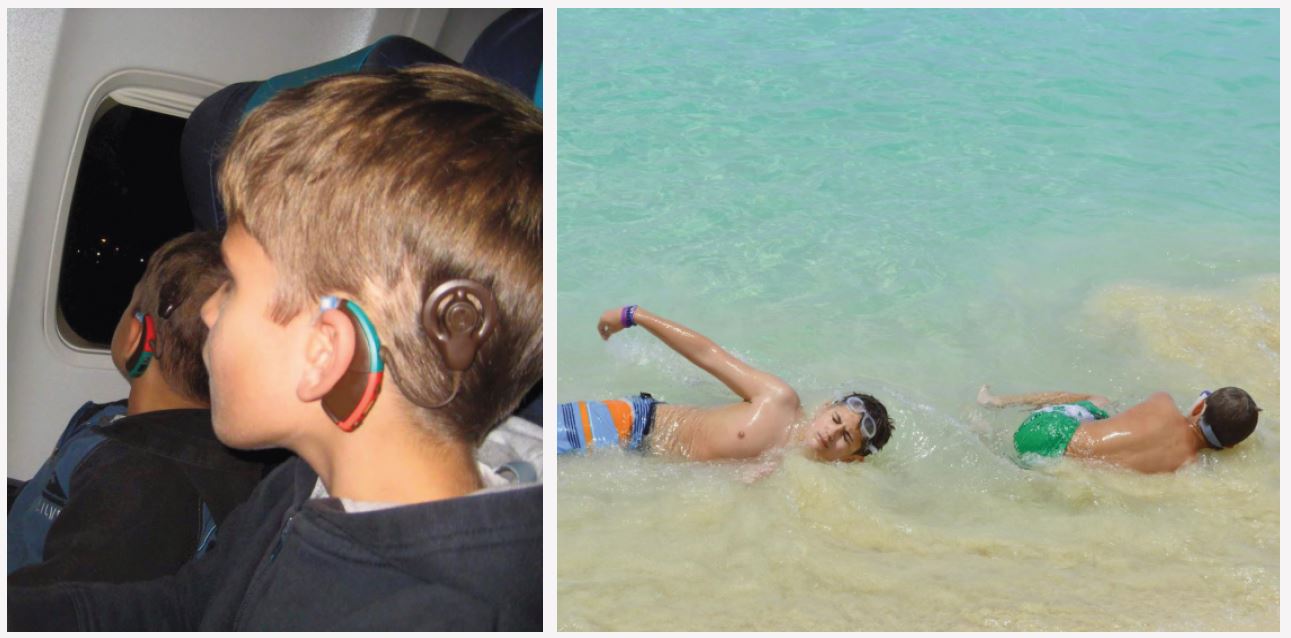Our family loves to pick up and go somewhere for a weekend, make a day trip, or turn disability-related activities into a vacation. However, we can't just pack a bag and go. In many ways, it is like preparing to travel with a baby or toddler.
For my sons, Ethan (21) and Gavin (18), who have Usher syndrome type 1b, there are still several considerations for travel, because of their needs. They were born with profound sensorineural hearing loss with no residual hearing, have
retinitis pigmentosa (causing tunnel vision and eventual blindness), and vestibular dysfunction. Along with the necessary accessories and extra parts, there are so many other considerations that sometimes it can feel too exhausting and easier to stay at home.

JET SET: (Above left) Ethan and Gavin, with their cochlear implant processors visible, check out the view from their plane seats; (Above right) Ethan and Gavin, without their processors, enjoy the beach in St. Maartens in 2015.
Early Years
There were plenty of trials and tribulations in the early years, as we adjusted to our children’s technology needs. Like most mothers, I was too hard on myself; taking all the blame when something went awry. When Ethan was a baby/toddler and we were adjusting to having a child with cochlear implants, I was terrified that I wouldn’t have enough batteries and his processor would die, leaving him without access to sound, during that crucial time for learning listening and spoken language. One time, we were getting ready to board an international flight when it hit me that I left Gavin’s processors on the counter at home. He
was about 18 months old. Needless to say, that was not a fun flight. Tears were shed as I thought what a horrible mother I was, and how could I do this to him. Luckily, we left a key with the neighbor, who I contacted once we arrived at our destination. She gathered the forgotten equipment and, at great cost to us that we couldn't really afford, she priority shipped them to us. Even when I brought them, it never failed, whether it was a short or long trip, one of the boys' processors would stop working and need to be replaced, then programmed. This was back when it meant a trip to the hospital/cochlear implant clinic when we returned, and a vacation without sound, because each had only one cochlear implant or reduced access, once they were both
bilateral. Today's technology allows processors to be programmed remotely and shipped directly.
"There were plenty of trials and tribulations in the early years. Like most mothers, I was too hard on myself; taking all the blame when something went awry."
Considerations
Depending on the disability, there are plenty of factors that families must take into account when traveling. For us, it includes lighting and the environment. For now, Ethan and Gavin are resisting using their canes, so we need to remember flashlights or headlamps. These days they tend to use their phones, but we always have backups. We make a point of providing them with visual descriptions of unfamiliar environments, so they are aware of obstacles at their feet or with low contrast that would make them hard to see, and put them in danger of tripping over or walking into them. If it’s a beach vacation or just a day at the beach, they often choose not to wear their processors, so we would have to let the lifeguards know that